#anti british men of letters
Text



(through megaphone) YUCK!!!!!
#with every season that passes the monster-killers-as-heroes messaging gets more ghoulish#the british men of letters executing every monster as soon as it enters the country lmfaooooooooooooooooooo FUCK OFF#true to irl britain's anti-immigration attitudes and islamophobia though <3#spn#liveblog tag#12.01
5 notes
·
View notes
Text
About Shipping Mick
Me at literally any Mick ship like Samick, Mickstiel, etc.:

Then there's these ships:

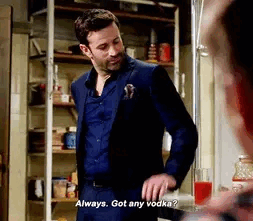
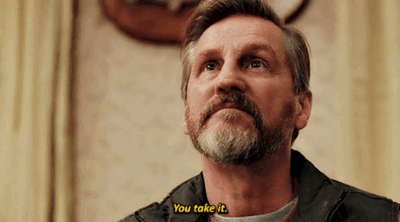
I proclaim them married, your honor. Might have given them kids...
#im a biased little shit and i know it#but we all are#anti samick#anti mickstiel#not a big fan of tfw either#you can bite me#british men of letters#archangels#princes of hell#supernatural#mick davies#adam fergus#arthur ketch#david haydn jones#gabriel#richard speight jr#ramiel#jerry trimble#i ship them so much#but only them#pulls out knife#my hunter#hisses like a feral cat#mick x ketch#kavies#mick x gabriel#mickbriel#mick x ramiel#ramick#my ships and i will fight you
7 notes
·
View notes
Text
Three more seasons to go, so I've decided in my head that the Men of Letters in other countries look at the Brits with a mixture of "There come those posh bastards again" and mild interest at how low humanity can reach. And that they are generally... Well, not a merciless cult of glorified rich people with a vested interest in monopolising magic. Because, let's be honest, that's their whole thing. They don't give a damn about security, they only care about control.
#anti BMOL#bmol#british men of letters#supernatural#spn#d watches spn#d watches season 12 for the first time
1 note
·
View note
Text
gonna finish s12 today even if it kills me

#i can't keep doing this like these british people are getting on my nerves so fucking bad#the season hasn't been bad like if we removed the british men of letters and just focused on the literal#creation of the anti christ it would be pretty solid#but the bmol plotline is dragging it into the MUD#walkie.talkie
0 notes
Text

Fendi pays tribute to Princess Anne with themed Milan show
This was the designer’s witty love letter from one strong, forthright woman within a powerful dynasty to another
Stephen Doig for the Daily Telegraph
Just this week, a colleague was extolling the wardrobe virtues of the “accidentally stylish” Princess Anne. And it seems that Silvia Venturini Fendi, the formidable matriarch of the Roman fashion house, is in agreement.
“I fell in love with the style of Princess Anne who, to my mind, is the most elegant woman in the world,” said Fendi, backstage in Milan. “When I saw the Coronation last year with Princess Anne in her uniform, I thought she looked beautiful. So I said ‘let’s be inspired for a men’s collection’.” The collection took the codes of the Princess Royal’s singular approach to dressing and applied them to men’s clothing, with a dusting of Fendi luxury in the mix.


“It’s a little bit Town and Country,” Fendi said of the distinctly British homage. “The Princess Royal is very rigorous in how she dresses, with this kind of military minded attitude, but feminine at the same time. She has a life outside the spotlight. She’s kind of an anti-fashion person, and to me that’s something that’s actually very fashionable and chic.”
Princess Anne’s status as a style icon over the years certainly hasn’t been by design on her part – leave the Princess of Wales to the Burberry while she dons House of Bruar – and was never the intention of the no-nonsense and hardworking royal, who favours practical country attire and Oakley shades over couture and experimental shapes, horse trials over the Gucci horsebit loafer. But that same sense of self-assuredness, stoicism and very British approach to dressing is just what appealed to Fendi in theming her show around the royal.


In actual terms, that translated into twinsets and chunky tweed skirts, heritage fabric coats – plaids spliced on plaids for a layered effect – waxed jackets and Wellington boots. The kind of attire built for yomps at Balmoral and Gloucestershire horse trials rather than the bars of Milan’s Brera district. The colours were those of the British countryside; olive, moss, oak and stone hues that evoked Gatcombe’s Green & Pleasant Land. The skirts, coincidentally, were in fact big, blousy Bermuda shorts designed to ape the appearance of Princess Anne’s solid kilts, although the royal herself has always mixed up the gender codes with her upright military uniform, so perhaps she’d approve of a bit of fluidity in that respect.


This being Fendi, a bit of experimentation with fabrication also weaved its way into the collection, with a tufted coat actually made from slivers of denim and some plush shearling on cropped jackets.
What Princess Anne would make of the sparkly suits on the willowy young men on the catwalk – perhaps a nod to her 1970s glamour – as well as the screaming furor from fans outside due to the presence of K-Pop stars and actors James Franco and Kit Harrington is anyone’s guess. But Silvia Venturini Fendi is no stranger to the singular position of being a strong, forthright woman within a powerful dynasty. It was a witty stylistic love letter from one woman of substance to another.


#kinda obsessed with the fact that this was inspired by anne#like it should happen more often#more fashion shows inspired by anne pls#annespired#princess anne#princess royal#fendi
85 notes
·
View notes
Text
Stalinist attitudes towards homosexuality and the events surroudning criminalization of homosexuality in Soviet Union in 1934 - excerpts from professor Dan Healey’s book „Russian homophobia from Stalin to Sochi”
In the same chapter I analyze the Soviet return to a ban on “sodomy” in 1933-34. It was a Stalinist measure, proposed by the security police and backed with relish by Stalin and his Politburo. Stalin personally edited the new penal article. This was the moment when the Soviet state adopted a modern anti-homosexual politics, the birth of modern Russian political homophobia. (…)
On September 15, 1933, deputy chief of the OGPU (secret police) Genrikh Yagoda proposed to Stalin that a law against “pederasty” was needed urgently. Stalin and Yagoda used the crude term pederastiia to discuss male homosexuality; but government lawyers revived the tsarist term muzhelozhstvo (sodomy) for the published law that was eventually adopted in March 1934. Yagoda reported that in August-September 1933, OGPU raids had been conducted on circles of “pederasts” in Moscow and Leningrad, and other cities of the Soviet Union. Yagoda wrote that these men were guilty of spying; they had also “politically demoralized various social layers of young men, including young workers, and even attempted to penetrate the army and navy.” From a recent collection of FSB archive documents of political cases against young Communists, it is clear that during the early 1930s, the secret police were obsessed with detecting counterrevolutionary moods among young people. Stalin forwarded Yagoda’s letter to Politburo member Lazar Kaganovich, noting that “these scoundrels must receive exemplary punishment” and directing a law against “pederasty” should be adopted. In the months that followed, Yagoda the secret policeman steered its passage through the various legislative drafts. (…)
When in mid-September 1933 Yagoda wrote to Stalin, recommending the adoption of a formal law against sodomy, he apparently cited a figure of 130 arrests of “pederasts” for the operations in “Moscow and Leningrad.” According to Ivanov, the archives of the St. Petersburg FSB reveal that during August-September 1933, 175 men were arrested on grounds of homosexual relations in Leningrad alone. The raids on “pederasts” continued and probably expanded to the principal “regime” cities, including Kharkov and Kiev. It appears that somewhere inside the central secret police machinery, an order originated in late July or early August 1933 to begin arrests of “pederasts” known to the authorities on their card-indexes either as “anti-social” or “declassed” elements, or as a security threat with international dimensions. (…)
In the 1993 release of correspondence between Yagoda and Stalin leading to the sodomy ban, one other significant document was published from the same file in the Presidential Archive. It is a sixteen-page letter to Stalin, from a homosexual British Communist, Harry O. Whyte (1907-60), an ex patriate journalist living in Moscow who loved a man who was a Soviet citizen. His Soviet lover was arrested sometime during late 1933 or early 1934. The release of the Whyte letter said little about its provenance and the author. It was typical of the 1993 publication that this document also appeared without commentary, but was labeled “Humor from the Special Collections” by archivists or editors who failed to show any historical empathy or intellectual curiosity.
Whyte, who worked for the English-language Moscow Daily News, wrote to Stalin, in May 1934, asking him to justify the new law. The journalist boldly explained why it violated the principles of both Marxism and the Soviet revolution. He argued that persecution of the law-abiding homosexual was typical of capitalist regimes and fascist ones: Nazi Germany’s “racial purity” drive was just the most extreme example of the push in both systems for “labor reserves and cannon fodder.” “Constitutional homosexuals, as an insignificant portion of the population . . . cannot present a threat to the birth rate in a socialist state.” Their position was analogous to that of other unjustly persecuted groups: “women, colored races, national minorities” and the best traditions of socialism showed tolerance of the relatively insignificant number of naturally occurring homosexuals in the population. He asked Stalin, “Can a homosexual be considered a person fit to become a member of the Communist Party?” In a revealing reaction, Stalin scrawled across the letter, “An idiot and a degenerate. To the archives.” Whyte got a blunt answer to his question: he was expelled from the Communist Party; he hastily left the Soviet Union for England in 1935. (…)
The dictator turned to his cultural spokesman Maxim Gorky, to explain the law’s rationale for Soviet and European readers. Gorky wrote an article that appeared in Izvestiia and Pravda on May 23, 1934, and later in a German-language socialist newspaper in Switzerland, in which he compared healthy Soviet youth to the degenerate youth of Nazi Germany. “Destroy the homosexuals - and fascism will disappear” he concluded, propounding the genocide of a social group on the grounds of sexuality. Later in 1936, People’s Commissar of Justice Nikolai V. Krylenko gave a speech to the central Soviet legislature in which he explained that the law was necessary because homosexuals were not healthy workers but “a declassed rabble, or the scum of society, or remnants of the exploiting classes.”
#life in the stalinist utopia am i right#don't let tankies trick you into overlooking the crimes of stalinism#stalinism#ussr#soviet union#eastern europe#lgbt#lgbt history#communism
156 notes
·
View notes
Photo

On this day, 24 February 1909, Ethel Macdonald was born in Motherwell, Scotland. She later moved to Glasgow, worked in retail, and became a socialist. When the Spanish civil war began in 1936 she travelled to revolutionary Barcelona and wrote for Scottish newspapers. She described how factories and villages were collectivised and how churches were turned into hospitals, libraries, and schools. Her writings also contain interesting details that help us to picture life at the time: British volunteers tended to get drunk upon arriving in Spain “perhaps… because they are unaccustomed to wine”; men and women soldiers were indistinguishable in dress, except that “all the girls had beautifully permed hair and were strikingly made up.” She also achieved fame as the English language voice of the CNT union radio station. Her reports were listened to around the world and her Scottish accent proved especially popular in the US. In May 1937 the Communist Party began to purge the anti-fascist movement of revolutionaries who didn’t agree with the Moscow line. In Barcelona, Ethel helped anarchists defend the barricades against CP troops, and later she smuggled food and letters to imprisoned comrades. She helped foreign anti-fascists escape Spain and the UK press dubbed her the “Scots Scarlet Pimpernel.” Soon she too was imprisoned by the CP, and upon her release she went into hiding, moving from house to house as she sheltered among Barcelona’s anarchists until she managed to get to France, and from there back to Glasgow. After the outbreak of WWII she received call up papers for Women’s National Service. She returned them with the words “Get Lost.” When she received further papers, she wrote back, “Come and get me.” Authorities decided against chasing the Scots’ Scarlet Pimpernel. She remained active in the radical movement until her death. Learn more about the civil war in our podcast eps 39-40: https://workingclasshistory.com/2020/06/17/e39-the-spanish-civil-war-an-introduction/ https://www.facebook.com/workingclasshistory/photos/a.296224173896073/2217287101789761/?type=3
179 notes
·
View notes
Text
Stating biological facts is not hate
By Genevieve Gluck. December 8, 2023
A Hobart City Council member is under investigation by the Anti-Discrimination Commissioner for “inciting hatred” after declaring “trans women are men.” Louise Elliot is now facing a costly formal inquiry by the Tasmanian Civil and Administrative Tribunal in a case which has the potential to restrict freedom of speech. If the tribunal rules against Elliot, she may be ordered to publicly apologize and pay a fine of up to $4,000.
In March, Elliot attended a Let Women Speak demonstration organized by Standing for Women and led by British women’s rights campaigner Kellie Jay-Keen. The event was intended to provide women with a platform to express their concerns or criticisms of gender ideology.
As part of a prepared speech she gave during the event, Elliot stated that it was impossible to change sex, that “trans women are trans women and remain biological men.”
During her speech, Elliot also highlighted how gender ideology poses safeguarding risks, noting how such policies impact women and girls.

“While the majority of men are decent, kind and caring people, men present an inherent danger to women. The vast majority of sex offenders and violence perpetrators are men. It is completely understandable that women would want spaces for females only, especially vulnerable spaces like changerooms, toilets, and showers. It is absolute insanity that we have a law that allows a man to at 10am declare he’s a woman and by 11am be sharing changerooms and showers with young girls.”
On May 5, Elliot received a letter from the Tasmanian Anti-Discrimination Commissioner (ADC) informing her that they had received a complaint about her statements and had opened an investigation into her activities for “inciting hatred” under the Tasmanian Anti-Discrimination Act.
The complainant, who cannot be named during the ongoing investigation, also took issue with a statement made by Elliot in the context of male violence and the defense of women-only spaces, wherein she stated, “You cannot be raped with a penis if there is no penis present.”
In November, Tasmanian ADC Sarah Bolt ruled that Elliot’s case would proceed to a tribunal inquiry. In response, Elliot has been vocal about her situation on X (formerly Twitter), and has promised to appeal her case to the High Court should she be found guilty of inciting hatred.
“If it is found that I have incited hatred with these accurate, factual, accurate, and true statements, then I won’t be standing for that. And I know that the majority of Australians don’t believe the truth can be hate. So we will absolutely be taking it all the way to the High Court, because this is a massive overreach on our implied right to freedom of belief, freedom of expression, political communication, and we need to defend that,” Elliot told Ben Fordham Live.

Elliot also noted that the legal attack against her is being funded by taxpayers. “The threshold for inciting hatred needs to be really high. It can’t be just because someone is offended. What really gets me is that it’s our taxpayer money that is funding this attack on freedom of speech.”
However, Elliot is expected to pay her legal fees out of her own pocket, and is crowdfunding to cover costs. In the event of a ruling against her and an appeal to the High Court, Elliot has said she estimates the process to cost $100,000.
In addition to the litigation, Elliot says she’s also been experiencing harassment from her colleagues for criticizing gender identity ideology. In a video she shared to X in October, Elliot described how she had been singled out for her views.
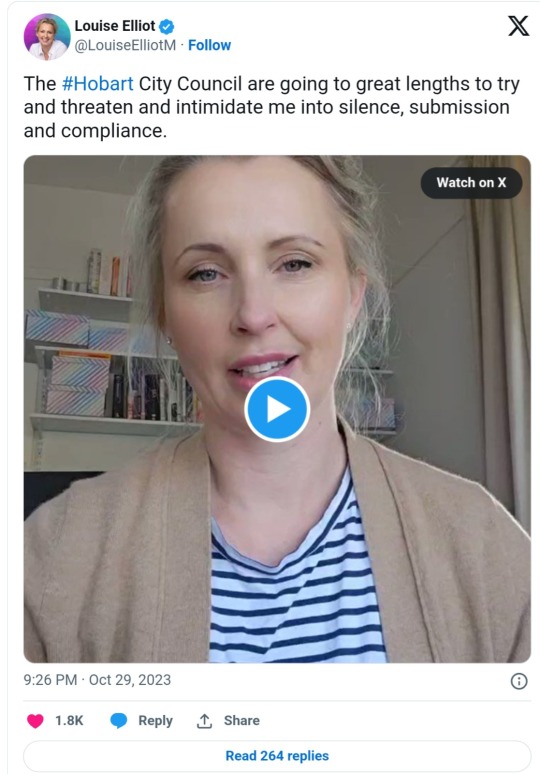
“Over the past several months, I’ve been copping some pretty heavy bullying by some of the Hobart City Councllors, and collectively as a council. You hear the Hobart City Council talking a lot about inclusion, diversity, and being welcoming and kind… But inclusion is welcomed if you agree with their thinking. If you don’t agree, then you are heavily excluded and targeted and bullied,” she said.
Elliot went on to explain that she does not believe that humans can change sex, and that women and girls are entitled to single-sex spaces and sports.
During one meeting, the Deputy Lord Mayor Councilor Helen Burnet put forward a motion that the council write to three different organizations to complain about Elliot. The councilors wrote to the Integrity Commission, the Anti-Discrimination Commission, and local government officials to request action be taken against Elliot over a series of posts she made on X.
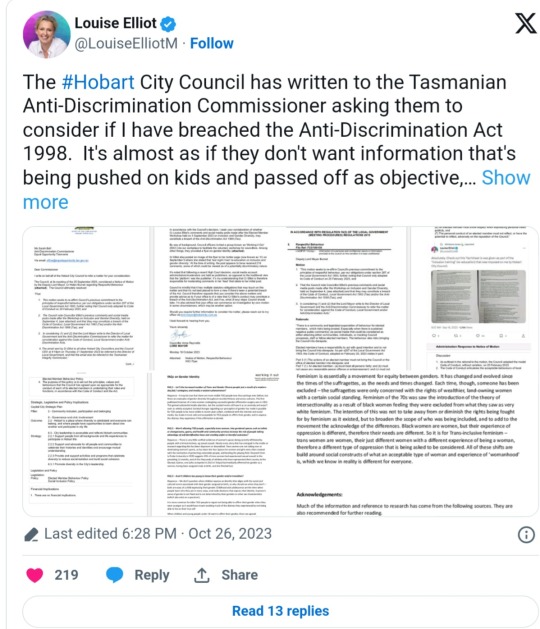
“We had a training session from a local organization, and I questioned some of the details that were in their fact sheet. Some of the details I found quite concerning, for example, statements that, ‘Trans women are not dominating women’s sport.’ I disagreed with that and tweeted some pictures of trans women playing in women’s soccer, and it’s happening globally,” Elliot said.
“In the fact sheet we had, they also tried to say that because black women are women, trans women are women. And I found that really quite a disturbing statement, quite racist and far from the truth.”
The fact sheet presented during the diversity training session, run in September by Working It Out Tasmania, also argued that trans-identified males do not pose a risk in female-only spaces.
“There is very little evidence of women’s spaces being secretly infiltrated by people with criminal motives, eg, sexual assault. Nearly every story that has emerged in the media or research regarding this has been disproven or discredited,” the document stated.
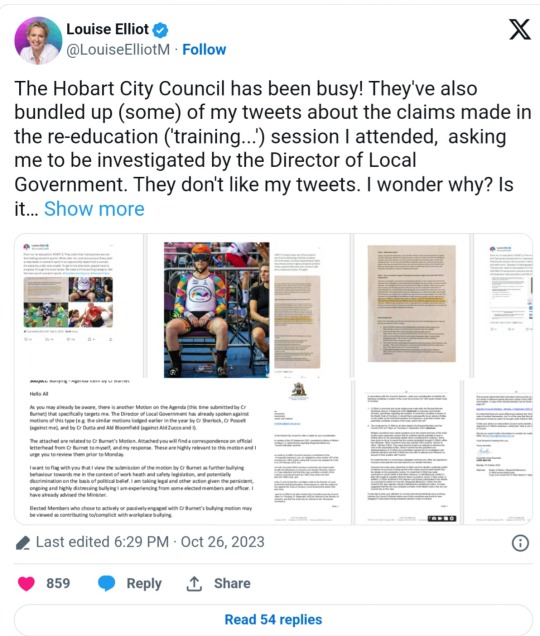
Elliot further revealed that she had been sent a letter by Deputy Lord Mayor Councillor Helen Burnet chastising her for her views.
“You have consistently spoken out against transgender people and have on the public record refuted that transgender women are women,” the letter read. At Burnet’s request the city council asked the Anti-Discrimination Commissioner to consider that Elliot had, in their view, breached the Anti-Discrimination Act of 1998, which was amended in 2019 to include the subjective category of gender identity, but does not presently provide legal protections on the basis of biological sex.
Elliot has said she has received a flood of supportive messages from constituents. In September, a small demonstration was held outside of Hobart City Council Town Hall, wherein protesters called on the Deputy Mayor to “call off the witch hunt” against Elliot.
#australia#Anti-Discrimination Commissioner#Stating biological facts is not hateful#Louise Elliot is telling the truth#Tasmanian Civil and Administrative Tribunal#Let Women Speak#Standing for Women#trans women are trans women and remain biological men#we have a law that allows a man to at 10am declare he’s a woman and by 11am be sharing changerooms and showers with young girls#Tasmanian Anti-Discrimination Act#Taxpayer money being used to censor women#Working It Out Tasmania#Why can't taxpayer money be used to fund third options for locker and rest rooms instead?
14 notes
·
View notes
Text
LDPDL, Incarceration, and Oscar Wilde's De Profundis
I was writing this up as a tangent in another post, thinking about IRL gay men at the turn of the 20th century as another source of Gothic literature Anne Rice was inspired by when she wrote the VC, and most importantly, how IRL Victorian-Edwardian era homophobia might have affected AMC!Louis as he struggled with his own sexuality/vampirism. Particularly, a point I made awhile ago about homosexuals & the mentally ill being locked up in sanatoriums. It just got way too long and off topic, so I've decided to post this bit first.
@wordforworldisforest noted that for all the reading Louis does in Eps2-7, we NEVER see him reading in Ep1 while he's still human. Iolanta's the first time we see Louis enjoy stories (plays/opera/books), but after he marries Lestat, Louis' reading whole libraries about heterosexual & homoerotic love & marriage. So I'm wondering what bb!Louis might've read during his human lifetime, too, and why he was keeping it such a secret from everyone--what/why was he hiding? And I started thinking about Oscar Wilde.
Closeted: Oscar, Louis & Vampirism
Oscar Wilde was the MOST (in)famous gay man during the late 1880-90s while Louis was growing up. If Louis was born 1877 (as per his gravestone in Ep5), he would've been 13 when The Picture of Dorian Gray was published, and 18-20 when Oscar was arrested for sodomy from 1895-97. De Profundis is the letter Oscar wrote to his male lover (Lord Alfred "Bosie" Douglas) while he was in jail, which was published posthumously in 1905. Ain't no way Louis didn't read it, or at least hear about it. 👀
Like, Dorian Gray's a known homoerotic book that was brought in as evidence during Oscar Wilde's sodomy trials. But Louis was 13 when it came out--MAYBE it flew under the radar for him, fine. But Louis's super stylish--he followed fashion trends (even in Dubai he's STILL casket sharp). And Oscar Wilde was a fashion icon/maverick in his heyday; an international sensation. But there was ALL KINDS of sexist/homophobic crap printed about Oscar cuz of the way he looked & dressed & styled his hair & carried himself in public (newspapers, Punch magazine, etc), before his love affairs with men were even made common knowledge.
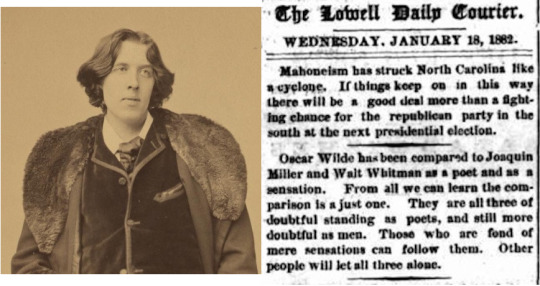
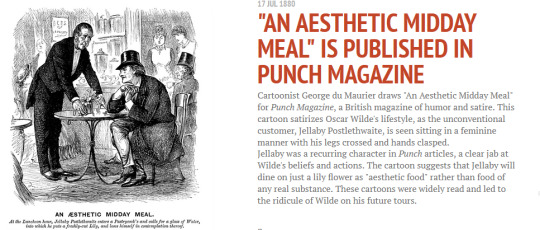
Oscar was a well-connected rich white man, and even HE caught flack from homophobes/xenophobes on both sides of the Pond for his effeminate behavior, and critiques against British and American aesthetics. While anti-Irish sentiments PALE in comparison to ACTUAL anti-black racism--(the Irish enslaved & lynched black folk same as any white racist colonizer, just look at Scarlet O'Hara--I've mentioned this before about racist Finn O'Shea, who burned the Azalea down in 1917)--Oscar being Irish definitely didn't help his reputation in British-American circles, as seen in anti-Irish caricatures from Victorian magazines like Punch.
Oscar, a world famous white man, served only TWO years of jailtime and it nearly KILLED him--so just IMAGINE what a gay black former pimp in Jim Crow South would've gone through.
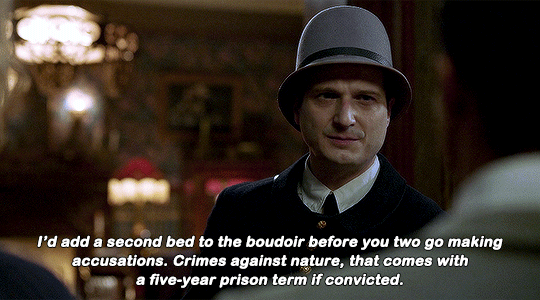
Vampirism's linked to xenophobia, as seen in my Brides of Lestat Dracula post (and speaking of Dracula....). But xenophobia against a white man's different from racism against a black man. Homophobic cops threatening Lestat's one thing--if he was on his own he'd've hypnotized the cops, ate a few of them, and skipped town long ago. He felt ZERO affinity or allegiance to the human world, populated merely by "the meat." Lestat embraced his alien status--Frenchness & vampirism, delighting in unsettling people & flouting social mores & gender norms. Since Louis insisted that they live as regular mortals, Lestat was "caught up in human affairs, too." But the ONLY one in any real danger of suffering the consequences of societal pariahism was LOUIS himself.

(De Profundis, Wilde)
Louis enjoyed a high degree of protection living with Lestat--the magical Frenchman who gave Louis the impetus to live more or less "out" in an open-secret gay relationship. But before meeting Lestat, Louis would've had ZERO security. Louis would've been around 18 when the scandal broke & Oscar was arrested, 22 when De Profundis was partially published, and 23 when Oscar died. His downfall likely would've been a frightening reminder for teen-20s Louis to stay in the closet; validating the need to keep up his image & the lies; but also contributing to his alcoholism, avoiding going to Confession, and ultimately his resistance to Lestat.

Loustat: Gilded Cages & Hubris/Pride before the Fall
So, I wonder how much Louis (AR/AMC) was pulling from Oscar Wilde in his own interview. Louis' access to Gothic/Victorian literature likely contributed to his excuses for Lestat's obvious vampirism (on top of NOLA's overall occult subculture); and Louis' own affinity for things that went bump in the night ("days were for sleeping off the previous night's damage," etc). But Oscar's lifestyle leading to his ruination & depression might've struck a chord with Louis too, considering his own fears/struggles with his sexuality.



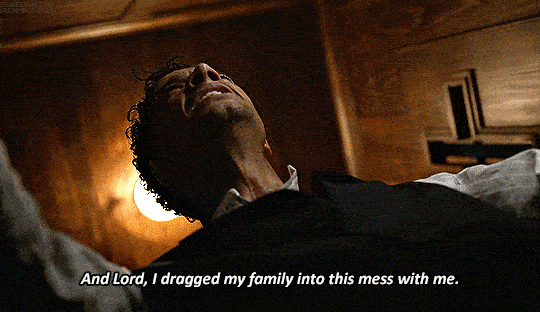

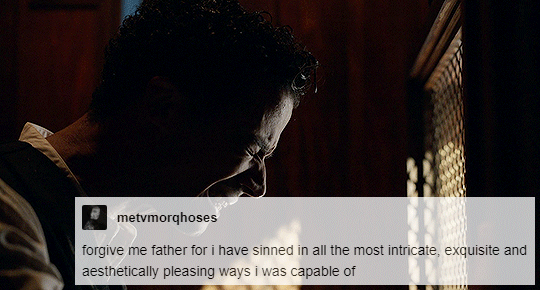
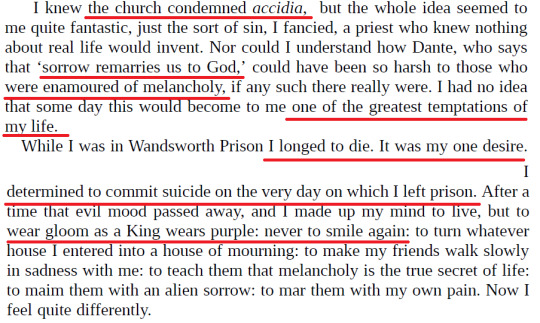
“[Louis] is so good at grieving! He wears woe as others wear velvet; sorrow flatters him like the light of candles; tears become him like jewels.” (TotBT).
Louis' life was dictated by fear--of being oppressed/disrespected, shamed, outed & ousted--publicly shunned. But vampirism proved to be the very embodiment of ostracism & imprisonment; with his Maker/"Massa" Lestat as the ultimate oppressor in their townhouse--the gilded cage/trap he built specifically for Louis. It's no coincidence that the Great Depression coincided with Loustat going "underground" to lay low after Claudia's murder sprees brought the cops to their door, and her running away from home led to Louis to stop taking care of the house or himself. (Accidia is the deadly sin Sloth.) Louis spent 14 years doing nothing but reading in the townhouse--7 while Claudia was gone, and 7ish while Lestat was gone. De Profundis was reprinted in 1912, and catholic!Bosie started openly repudiating Wilde & other homosexuals by 1918. So Louis definitely would have had time to read all of Oscar Wilde's works from 1923-37 (Claudia leaving & Lestat coming back).
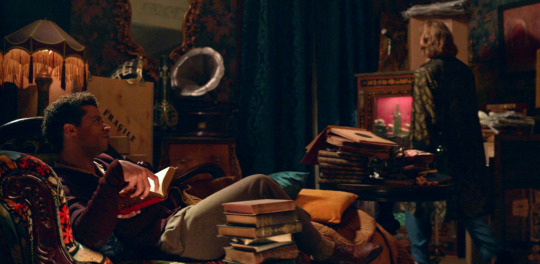
Oscar painted a grim picture of what prison was like on the inside, and what public humiliation was like on the outside. For a prideful man like Louis, shame & humiliation was his worst nightmare--Icarus "flying too close to the sun," as the Alderman put it. (Louis was in his 60s the first (& last) time he openly kissed Lestat at the Mardi Gras ball--the night he was gonna leave America for good anyway.)


So I'm certain Oscar Wilde's scandal would've negatively colored Louis' developing outlook on his own homosexuality. And if Louis was (re)reading Wilde after Loustat's separation/divorce, it must have resonated, perhaps even moreso, as history repeated itself.
Lestat & Louis have been compared to Oscar & Bosie before. Their stories aren't perfect 1:1s ofc, but it's the overall Mess that most resembles Loustat. Oscar was an older, worldly, far better educated man; Bosie was a spoiled but broke little lordling whose hedonistic lifestyle of male prostitutes was bankrolled by Oscar. Bosie's homophobic father was determined to see Wilde ruined, and had him arrested for sodomy. Oscar was sentenced to 2 years of hard prison labor. Jailtime made Oscar reevaluate his life, his impending death, and his relationship with Bosie--"the love that dare not speak its name." Oscar was HELLA critical of Bosie in De Profundis, and after being released from jail they split up; Oscar fleeing to Paris where he soon died. Bosie converted to Roman Catholicism, and after Oscar's complete letters were published in 1912 he publicly repudiated Wilde, renouncing homosexuality and marrying an heiress, only to die penniless anyway. Ohhhhh, Louis would've eaten that news up, I know he did.
Just look at how Oscar talks to Bosie in his letter, and tell me it doesn't sound like Louis' talking/complaining about Lestat:



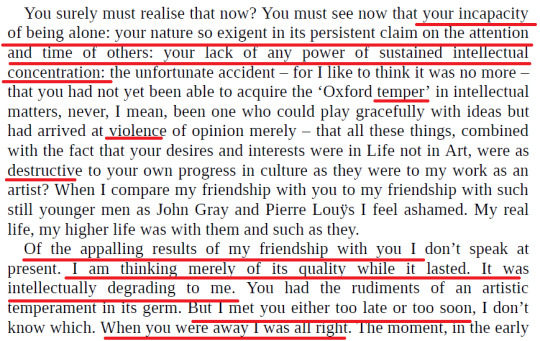


Plenty of scholars have pointed out Oscar's hypocritical criticism of Bosie, as he reams Bosie for filth for half the letter, then talks about not being bitter towards him & finding Jesus & forgiveness for the second half. Likewise, I've said before that Book!IWTV reads like a hit piece, Louis skulldragging Lestat while downplaying Louis' own culpability in his downfall. However, AMC!Louis takes more accountability than book!Louis, focusing on the ways HE in particular failed Claudia (and himself), rather than blaming so much of it all on Lestat. Louis' more forgiving of Lestat than Daniel/the show leans--perhaps cuz Claudia's older; able to act against Lestat the way Louis couldn't bring himself to, even for her.

But naturally, AMC!Louis has more on his plate than book!Louis ever did, as the racial/societal challenges of their time also played a much more significant part in Lestat's relationships with Louis and Claudia souring. Louis' far more ambitious, but doomed, so his fall from grace hits that much harder, as he blames himself more for the things he could and couldn't control.

Loumand: Wardens, Austerity & Suffering
My final point concerns Louis' time in Dubai with Armand. Here, the notion of imprisonment takes on a far more disturbing flavor, because Louis is mentally ill/traumatized. He's completely surrendered to Armand; who isn't pampering/spoiling him like a prince(ss), so much as nursing/babying him like a mental patient in a padded cell.

Loumand's cold & hollow penthouse is the polar opposite of Loustat's lush & vibrant townhouse. They're living like monks. Ofc that tracks with Catholic austerity (see this awesome post about Louis & Anchorites); but I also suspect Louis might've consulted New Age Buddhism as a form of therapy/meditation too--cuz what's with the tangzhuang outfit? 🤨

It's the most out-of-place piece in Louis' Dubai wardrobe of highwaisted slacks & tops. And for a show that's so dang particular about clothes & colors & cuts etc, this HAS to mean something. And considering Louis' penchant for monastic self-denial, I think De Profundis has interesting parallels with Catholicism and Buddhism.

Like, Louis has access to all the modern marvels of science, and as much blood as he can get--"AB- fresh from the Farm," Damek, Dr. Fareed, blood banks, exotic animals, etc. Yet he's also eating human food, even though it tastes like chalk/paste, just to humble/deny/punish himself. (It's as hypocritical as it is sincere, crazy enough.)


It's all sus, cuz we know Armand's a master hypnotist with the Mind Gift & Spell Gift. Louis' interview seems less like the confessions of a suicidal/grieving man, or the unburdening of an incarcerated/rehabilitated man's guilty conscience. Instead, Louis seems like he's speaking from the Sunken Place; like he's one trigger away from a complete and utter meltdown.


Which makes it veeeeery interesting that Louis keeps pushing/suffering through the interview, despite his pain; while Armand seems to be VERY against the entire endeavor--the one who keeps trying to get them to stop talking about the past at all.... 👀
So yeah, this was all swirling around, keeping me from getting any effing sleep. I hate this show.
15 notes
·
View notes
Text
Tiger Man
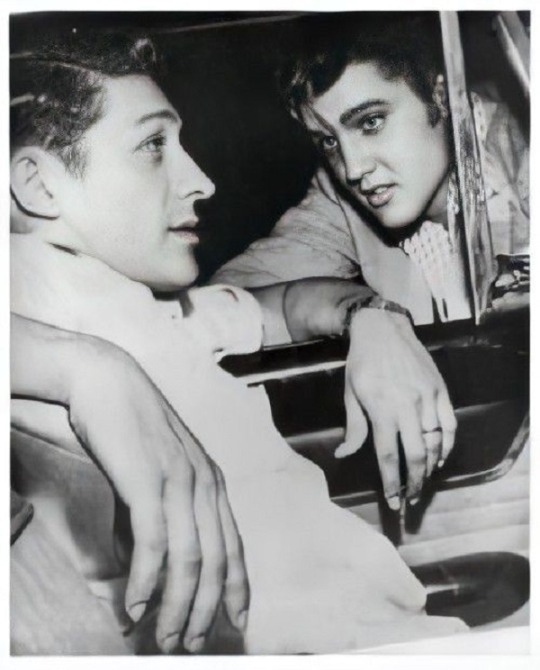
Summary: The year was 1941, bandmates and secret lovers Scotty Moore and Elvis Presley got caught red handed by Scotty’s fiancée, and this led to the young men being thrusted headlong into the China-Burma-India theater of World War II as members of the first American Volunteer Group (The Flying Tigers).
Chapter 3. Lost and Found
Pairing: Scotty Moore x Elvis Presley (m/m)
Word count: 2.4k
Warning: grieving, comfort sex, bombing of civilians
New Year 1942 brought with it new rounds of air combat for Elvis, Scotty and their squadron. They were sent back to southern Burma to reinforce the 3rd squadron there in the Battle of Rangoon. By then the Japanese had launched a full-scale campaign to take over the capital city of the British colony. To provide air coverage for the British and allied troops and to deliver ground attacks on the enemy, the Tigers had many encounters with groups of Japanese fighter planes known as “Oscars” and “Nates” and managed to come out victorious despite being outnumbered and outgunned repeatedly. In the process, the dynamic duo from Memphis was able to destroy another three enemy aircrafts with their seamless collaboration by the time spring turned around. From cousin Gene’s communication, it appeared the achievements of Flying Tigers even received a wave of publicity as part of wartime propaganda stateside, being among the few bright spots that could be gleaned from early part of the American involvement.
The overall direction of the war was not in their favor, however. The British was losing their footing in Burma to Japanese army’s advances, despite some reinforcement from the Chinese Expeditionary Force sent by the Chinese Nationalist government. After the fall of Rangoon, the Japanese ground forces began their relentless sweep northward through Burma. To aid the allies and distract the invaders, the Tigers started to take on risky missions such as carrying out air raids on Japanese bases in Thailand. Bomb racks were added to their p-40s for this purpose. In retaliation, large groups of Japanese fighter-bombers plagued the British airbases in Burma. Unsurprisingly, the Tigers began to suffer more casualties as the Burma Campaign wore on. A few good men had been lost in intense air battles or fell victim to powerful anti-aircraft artillery. Moreover, some p-40s were destroyed on the ground during enemy air raids. When their planes were damaged during battle, the parts for repair were very hard to come by. All of these factors caused the size of each squadron to dwindle and overall morale to slip. As the Imperial Army overwhelmed its ill-prepared and poorly equipped opponents during the spring months, it became more and more apparent that Japanese occupation of the entirety of Burma would be inevitable.
Despite all the setbacks in Burma and eventual retreat of his Squadron back to the southwest Chinese province of Yunnan, Elvis continued to perform well on all his missions, even managed to expand his air-to-air victory scores to five. Thus, along with Scotty who had six under his name, the former graduates from Humes High had officially become a pair of flying aces. Elvis wrote about this achievement with pride in his letters back home, jubilant over the bounty money he had earned for each kill which he would be sending to the family. Naturally he neglected to mention the precarious position the squadron was facing as the allied forces were being pummeled in this part of the world, the hardship they had to endure due to lack of supplies, or the close calls he had encountered numerous times during his air combats. He figured that Daddy and especially Mama did not need to know about these unsettling details. International mail service during wartime was shoddy at best, there was no telling if and when his folks would receive this communication. But Elvis kept writing regularly, the thought of family receiving good news like these was comforting and always served to lift his spirits.
Scotty sat on the wing of his fighter plane one day in April, inspecting the repairs the ground crew had just made to the wing guns. The Tigers were now based near the Chinese city of Baoshan, which was one of the locations near Burmese border under frequent aerial harassment by Japanese bombers and fighters. Another pilot, Joey Cooper, walked over from the direction of the barracks and stopped next to the plane, a look of concern on his face: “Hey Scotty, will ya take a look at Elvis? He got a telegram from home today, probably bad news. He was crushed and hadn’t spoken to anyone since!”
Scotty’s heart skipped a beat: “Oh no! I hope it had nothin’ to do with his Mama!!”. He jumped down from the plane instantly and ran towards the barracks. Scotty ran into two other pilots on his way there and they seemed to know automatically who he was looking for. “We tried…” One of them uttered apologetically and pointed at the entrance of the flat brick structure behind him. Scotty rushed in the door but then slowed down when he came upon the sad and lonely figure at the far end, lying in prone position with his face buried in the familiar single wire bed. His heart throbbed painfully as he started to make out the muffled sobs emanating from the young man. “Elvis, baby. What happened?” Scotty asked as he sat down at the edge of the bed.
Elvis’ shoulders shuddered for a second, then slowly he lifted his head. Tears streaming, nose running, face flushed, Elvis looked so pitiful it evoked an overwhelming sense of tender protectiveness within Scotty. He pulled his beloved over and held him tight, that was when Elvis finally made out something coherent: “Scotty, Mama is gone… I-I-I got nothin’ left no more!” He sounded so nasally it was almost like coming from another person. Scotty’s heart plunged into sorrow as the dreaded news was confirmed, he knew just how much Gladys meant to her son. He squeezed Elvis a little tighter, lightly patted his back in a soothing gesture, “I’m so sorry, baby. Life throws curveballs at us sometimes. I know it’s real rough.”
“Everyone at home were trying to keep it from me about how sick she had been. Last I heard she was amazed to hear about the Tigers in the news!” Elvis finally responded amidst a string of sniffles. He pulled back a little and that pair of large teary sapphire eyes locked up with Scotty's steely blue: “I should have seen it coming. I worried about her health but never, never thought she would leave this world so young. It’s just not her time to go.” He wiped his face messily with the back of a hand: “They said her liver and heart gave out. I know it, I worried her into an early grave!”
It pained Scotty to see his baby so lost and despondent, he had to will himself not to lean in and kiss away all his tears. He reminded himself they were in public, and anyone could walk into the barrack any time. So instead, he gently caressed the sobbing young man at the back of his neck: “Don’t think that way, honey. She was called on by God ’cause her earthly trials were done. She had been proud of you before she passed. Believe me, your Mama would want you to be strong like how she had raised you.”
With this gentle consolation Scotty stood up and walked over to the sink with a washcloth. He turned on the tap until warmth was slowly felt in his fingertips. He soaked the washcloth in water and then wrung it out before turning off the faucet. He then returned to the grieving young man who was sobbing and rambling, clasping a small, faded family picture in his hands. “Come on baby, let’s clean up your face.” Scotty sat down on the bed, nudged Elvis’ back a little and suggested. It almost felt like taking care of a small child as Scotty supported the back of Elvis’ head with one hand while using the other hand to pat his face with the slightly damp cloth. “Now there’s the flying ace Elvis Presley that I know.” Scotty joked as he tidied up the face of his flying partner and smooth out the wrinkles on his uniform.
Still looking numb and stiff from the tragic news, Elvis murmured: “I never got to see her one last time. It was all my fault, I left Satinin on her own. All those long nights she must’ve stayed up fretting for me… This is how God punishes me, he takes her away and, and I’ll never get to see her sweet face again!” His voice started to break down again while fresh tears circled in his mournful eyes.
“Listen to me, baby!” Scotty grabbed Elvis by the shoulders and shook him: “I know losing your Mama is a lot to handle, she meant the world to you. But you’ve got to toughen up for yourself and the rest of the family. You still have a lot to live for!” Staring Elvis straight in the eyes, Scotty’s tone turned from firm to tender: “I need you to be strong and brave for me, Elvis. Life is fragile, especially during wartime. Hundreds and thousands are suffering and dying all around us, but we still got each other. You are my true love; it breaks my heart to see you so heartbroken. In a few months our contract would be up with the Tigers, and we’ll get to go home then. We can go visit your Mama’s grave together and bring her flowers.”
“D-did you just call me your true love?” Elvis stammered with a stunned expression on his face. He looked so cute Scotty wished he could take him right then and there. Instead, he played it down: “You know what you heard.” “Scotty, you’ve always believed in me even when I didn’t believe in myself. Without Mama I’m lost, but you’re such a blessing.” Elvis straightened up, took in a breath before speaking resolutely: “I promise from now on I’ll be strong for you and be worthy of your love.” His sincerity was promptly rewarded by a warm hug from Scotty, who managed to sneak in a kiss on the forehead too.
Elvis was given the next two days off for bereavement. Scotty was excused from regular duty as well, specifically tasked to cheer him up since it was obvious that only Scotty could prevent Elvis from crumbling psychologically. Both were now suffering from lack of sleep because it took most of the night for Scotty to calm Elvis’ sobbing and coax him to sleep. Elvis also lost all appetite ever since the terrible news. Far too quiet to be normal, he was noted by others to be often lost in thoughts. Taking account of all this, Squadron leader Tex encouraged Scotty to find Elvis some “distractions”. The implication was for the older pilot to take his grief-stricken partner to Baoshan city to seek some pleasure in brothels. Naturally the two lovers spent the precious time off with each other instead.
The owner of Changrong Inn smiled knowingly at the two tall American soldiers who checked into his modest hotel. Mr. Sun was fond of the foreign couple who had stayed a night here occasionally over the last month or two. They were polite and discrete, never got drunk or caused a fight, and most importantly, tipped well. He had even suggested some choice local eateries and nearby sightseeing locations to the nice young men. Business was slow over the last few years in this Chinese city under constant threat of Japanese invasion. Mr. Sun wished he had more wealthy and trouble-free tourists like these for customers, what they did behind closed doors was no concern of his. The thought was pushed aside as he handed the keys of one of his nicest rooms to the Americans.
Once inside the room and isolating themselves from the rest of the world, Scotty and Elvis were immediately locked in passionate kisses, hands going under shirts and fondling up and down bare shoulders and backs. They pressed their bodies against each other so tightly it felt like they almost melted into one. It took considerable patience and willpower for Scotty to unbutton and undress his lover properly. Elvis on the other hand was not so patient. He only managed to take off Scotty’s jacket and unzip his trousers. When guitar slinger’s already excited member popped out of his clothes, Elvis’ knees became weak and wobbly. He could feel the radiating heat and pulsing veins as he took the growing organ into his hands. With barely a push down on his shoulders, Elvis kneeled down at Scotty’s feet and kissed him on the tip. Licking along his length and lapping up his precum, there was a streak of desperation in those beautiful eyes as Elvis eagerly wrapped his mouth around Scotty and took him down as deep as he could. Scotty knew at that moment that Elvis needed him just like roses needed rain. He was the only one who could fill up the gaping hole which was in the young man’s heart, and make Elvis feel alive again.
Tears of contentment and gratification streamed down Elvis’ face as he let his lover use him any way he pleased. The more seasoned pilot kept his hands buried in those soft locks of light chestnut hair and held that pretty head still. He pushed against the back of Elvis’ throat repeatedly until a mind-numbingly satisfying release inside of his younger partner.
Twice more Scotty would spill his seeds within his gorgeous lead singer that night by the time their romp in bed was over. Elvis reached his own climax while being slammed from behind as he laid beneath Scotty. While he slipped into restful sleep for the first time since three days ago, he vaguely remembered being sponged clean caringly by his guardian angel, and the overwhelming sense that Scotty was what makes his life worth living in this lonely and perilous world.
The couple’s peaceful slumber was shattered by loud sirens as morning came around. This was soon replaced by sounds of explosion, low-flying bombers and screaming civilians as they were cut down by strafing machine guns. Scotty shouted: “Air raid!” In the blink of an eye, he pushed Elvis down one side of the bed and then rolled down himself only seconds later. As the pair huddled under the bed, their room shook for a few moments due to a stray bomb which landed within the confines of the Changrong Inn itself. A cloud of smoke and panicked cries could be heard rising out of the east wing of the little hotel. The rumbling of distant artillery suggested ground troops were not far from the city. The lovers embraced each other without words, both knowing in their hearts that Japanese army was moving closer, a full-scale confrontation was soon to come.
9 notes
·
View notes
Text
This is one of the most smirk worthy moments of the first volume of Charles de Gaulle's war memoirs:
"... on October 7th [1941] I addressed a note to Mr. Churchill to update him on our wishes and means [to have the Free French engaged in the North African front]... At the same time, I wrote to general Auchinleck, commander in chief of the east, to remind him of how much we wanted our troops to fight in Libya... On October 9th I visited Mr. Margesson, War minister of Great Britain, and I begged him to intervene. Finally, on October 30th, I instructed general Catroux on the conditions in which it was convenient that our forces were employed, that is, in big units.
I did not receive any British response until November 27th. It was addressed by general Ismay and Mr. Churchill. Their letter was the equivalent to a rotund rejection, as polite as it was sharp. To explain their refusal, our allies appealed to "the dispersion of the French units across different spots in Syria", the fact that "they were not trained to act as divisions or brigades", and finally, "the insufficiency of their equipment". They expressed, however, the wish that, sometime in the future, the question could be re-evaluated.
The English command was evidently planning on achieving the conquest of Libya and ending Rommel without the French. It is true that they had there considerable land and air forces, and that they believed admiral Andrew Cunningham -magnificent chief and sailor- to be in a position to do more than miracles, by intercepting the communications between Italy and Tripolitania.
It is to be easily imagined the disappointment that the English answer produced in me. I could not allow our troops to remain inactive for time indefinite, while the fate of the world was being sorted in battle. I would rather risk a change of direction. And so, then, I called Mr. Bogomolov and I asked him to make his government know that the National Comittee wished for some French forces to participate directly in the allied operations on the Eastern Front, in case the North African theater was closed to them. I, naturally, made no secret in London of my negotiation.
Even before I received an answer from Moscow, the British intentions had already changed. On December 7th, Mr. Churchill wrote to me a warm letter to tell me that "he had just learned how much general Auchinleck wished to employ a Free French brigade in the Cirenaic operations". "I know", the Prime Minister added, "that this intention matches your own wishes. I am also aware the eagerness your men have of meeting the German face to face."...
At Cairo, Catroux arranged then, with general Auchinleck, the departure towards Libya of the first light division, while Koenig, in charge of negotiating the details, obtained from our allies, a useful bonus in anti-tank materials, anti-aerial guns, and means of transport...
But, if the first light division got an opportunity, nothing was being done for the second one, which languished in the East. And I was determined to see that one taking part as well in the operations. Precisely, on December 10th, Mr. Bogomolov had come to tell me that my project of sending French troops to Russia had been warmly received by his government, and that it was willing to facilitate to our forces on the spot all the necessary material. I began, then, to consider the expedition East, of not only the aviation group Normandie [which, according to De Gaulle, was the only element of the Western allies that fought on the Eastern Front], but of the second light division as well. This one, departing from Syria through Baghdad, would cross Persia in trucks and then, from Tabriz, would be transported by train to the Caucasus... On December 29th I wrote to general Ismay communicating to him my intentions, while at the same time giving the necessary instructions to general Catroux. The second light division was to depart on March 15th towards the Caucasus, unless it was admitted before that to Libya.
The British command opposed this project of moving this unit to Russia with all the possible objections. But in Moscow, on the contrary, the Soviets made a deal of it. Molotov speaking to Garreau, and Panfilov to Petit, asked us to put it in practice. Mr. Eden, once acquainted with this, entered the fray and wrote to me to support the point of view of the English military authorities. I could do nothing but defend my own, and it was the one that in the end was adopted by the end of February by the allied command. Ismay communicated it to me. Auchinleck asked Catroux to put at his disposition the second light division. This one left Syria and arrived at Libya the last days of March.
De Gaulle: you are sorry you think my divisions aren't good enough? That that is the reason why you cannot include them? No problem, I'm gonna ask Stalin if they are too poor for him as well. Well, well, well, would you look at that, apparently the Russians would be delighted and can provide what we are lacking. Oh, now they are good enough for the desert campaign all of a sudden? That's what I thought.
Iconic.
#WWII#Charles de Gaulle#History#the more I read the more impressed I am that this guy managed to get anything done
3 notes
·
View notes
Text
Letters
Jeremy Clarkson’s abhorrent views on Meghan reflect the society we live in
Zoe Gray says the treatment of the Duchess of Sussex confirms that Britain is a place where the media can bully a woman so much that she has to flee. Plus letters from Averil Ashton, Ruth Rowles and Ralph Lloyd-Jones
Wed 21 Dec 2022 18.55 GMT
Re Zoe Williams’ column (Violent misogynistic fantasies like Jeremy Clarkson’s are not new – but the Sun gleefully publishing them is, 19 December), last week I felt confused about why I had found the Harry and Meghan Netflix series upsetting to watch, unsurprised as I was by their treatment from the media and the royal family.
As I read Jeremy Clarkson’s violent opinion, I realised it was because of what Meghan’s experience, Jeremy’s reaction and the Sun’s complicity confirms about the society I survive in. The sort of place with the type of media that take visceral pleasure in tearing a woman apart, bullying and hounding her until she is unsafe and has to leave. And then punishing her for leaving with mockery and bile. Game of Thrones is the medieval point of reference for a reason.
This is, and isn’t, about Meghan. Her treatment tells us everything we need to, and don’t want to, know about this country. If these words are being printed in national newspapers, what do you think the men responsible for writing and publishing them are saying behind closed doors?
So we complained to Ipso, so the piece got taken down, so Jeremy issued a bullshit apology. What next?
Zoe Gray
Waltham Cross, Hertfordshire
-
Zoe Williams’ article sums up my feelings too. But Jeremy Clarkson does not speak for the over-60s at all, despite his wild assertion that “Everyone who’s my age thinks the same way”. We don’t. I don’t know anyone who agrees with Clarkson’s violent, racist fantasies.
I am in my 70s and I am deeply worried to see such anti-women and racist comments gaining ground in the mainstream media. People of my age, of every age, must start speaking out loudly against these views. Just because we are a certain age, it does not make us all rightwing, racist misogynists.
Averil Ashton
Calne, Wiltshire
-
Nesrine Malik may be missing a point (Why the woes of Harry and Meghan tell us little about British racism, 19 December). It is because of their position at the heart of Britain’s most historical and established institution that Harry and Meghan can bring to light the entrenched attitudes of racism, bullying, class, conservatism and lack of empathy, deeply wired into our culture, at the very centre of the establishment. To disturb the status quo at the palace is to challenge the very foundations of these corrosive “values” that run through society. Yes, they are privileged, yes their experience doesn’t necessarily touch the everyday struggles of everyday people. But they are playing their role in our collective attempt to change and heal, bringing their experience and influence to bear where they can, and have the privilege to do so.
If everyone plays their part, faces the challenges on their own doorsteps, collectively change is evoked. Let’s value everyone’s experience and contribution, not devalue it because it doesn’t encompass everything.
Ruth Rowles
Whaley Bridge, Derbyshire
-
I am slightly worried by the fact that I am exactly one day older than Jeremy Clarkson. Contrary to his assertion that everyone his age will agree with him, I rather like the Duchess of Sussex and have always found Clarkson a complete and utter ghastly twonk.
Ralph Lloyd-Jones
Nottingham
#meghan markle#prince harry#jeremy clarkson#harry and meghan on netflix#uk against racism#misogyny#racism
16 notes
·
View notes
Text
As the Spanish American empire disintegrated after [...] 1808, juntas from Mexico to Buenos Aires began to pass declarations of independence and constitutions. They also turned to the early modern legal tradition of privateering, or private prize-taking, which had allowed British, Dutch, French, Portuguese, and Spanish subjects to prey on the enemy’s merchant fleet since the late sixteenth century. Privateers sailed with the permission, or letters of marque, to engage in maritime warfare. In this well-written and succinct book, Edgardo Pérez Morales tells the story of the anti-Spanish privateering project engineered by the Republic of Cartagena on the Caribbean coast of Colombia. In doing so, he shows how privateering became an unexpected tool of revolutionary politics in the Atlantic world.
Privateering, Pérez Morales argues, was not only a legally sanctioned practice that targeted the enemy’s merchant fleet; it also reflected Cartagena’s radical open-door policy. At a time when racial equality was associated with revolutionary Haiti in the minds of many white Creoles, a coalition of egalitarian free men of color and white Creoles pushed for the adoption of one of the most radical constitutions in the Atlantic world in 1812: not only was slavery abolished and racial equality proclaimed, but the new republic allowed foreigners to settle in the port city and become naturalized citizens, thus ending existing Spanish colonial restrictions. The recruitment of European and Afro-descendent Caribbean privateers was part of this strategy to turn Cartagena into a cosmopolitan haven. Privateering also served, according to Pérez Morales, as an “act of sovereignty” that revealed the existence of alternative communities before larger national states crystallized (p. 13). [...]
Although the Republic of Cartagena only lasted from 1811 to 1815, it played a key role in early struggles for independence in Spanish America because of “its growing maritime connections, increasingly radical anti-Spanish leaders, and vibrant cosmopolitan dynamics” (p. 6). The book concludes with the fall of Cartagena after a prolonged Spanish royalist siege. [...]
-------
Two outside influences played major roles in this history of Cartagena's privateers.
The first was Cuba, which remained loyal to Spain and committed to plantation slavery. By making Cuba the main target of their attacks, Cartagena's privateers undermined Spanish power [...].
The second foreign power that looms large in this history of Cartagena is Haiti: the former French colony had already abolished slavery and proclaimed the equality of all men. Haiti was, in Pérez Morales's words, the "natural ally" of the Tierra Firme privateers. It supported the privateers -- many of them were Haitians -- and even became the refuge of many republicans when Spanish forces closed in on Cartagena in 1815. [...]
-------
In discussing these topics, Pérez Morales also centers the role of free men of color both on land and at sea. He uses privateering to trace the discrimination Afro-Caribbean people faced after independence and why Latin American histories have ignored Cartagena’s maritime story and the privateers who participated in it. While racial equality remained an essential part of Colombian republican identity, politicians and historians were eager to dissociate their revolutionary past from Haiti. By breaking ties with Haiti and erasing its role in these earlier privateering efforts, Colombia stood a better chance of having its independence recognized and at fashioning itself as a legitimate (and whiter) country.
-------
Privateering involved multiethnic and multinational crews in a flexible but still hierarchical organization [...]. Although Cartagena declared free men of color to be citizens when it declared independence in 1811, privateer captains, like Aury, were of European or US origin, raising questions on the truly emancipatory potential of privateering. The privateers of Cartagena might have been eager to recruit sailors of African descent, but so were other imperial and royal navies at the time. [...] Because Cartagena’s maritime archives did not survive, Pérez Morales cannot really delve into the economic impact of privateering for the [...] formation of Cartagena. [...] Even if its existence was short-lived, its radical potential, especially for Afro-Caribbean sailors, lived on.
-------
Text by: Vanessa Mongey. “Mongey on Perez Morales, ‘No Limits to Their Sway: Cartagena’s Privateers and the Masterless Caribbean in the Age of Revolutions.’“ Published on H-LatAm (H-Net / Humanities and Social Sciences Online). July 2019. A review of the book by Edgardo Perez Morales.
21 notes
·
View notes
Text
D-Day
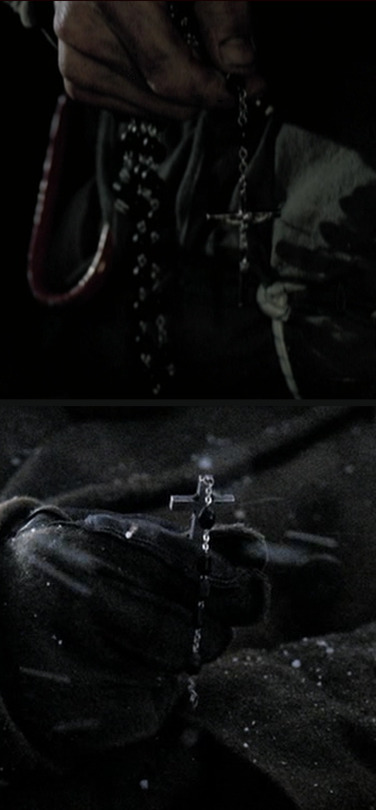


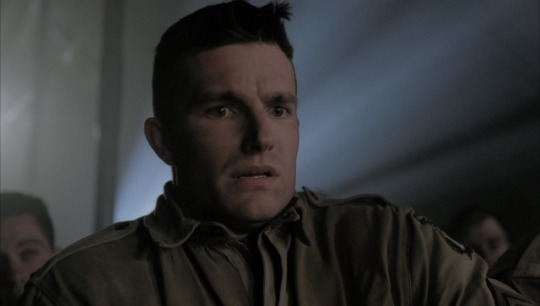


*Author's Note: I am using the movie version of how Bill learned about his brother's death. The account of Wild Bill's actions after he landed in Normandy came from Guarnere's book and the movie. A special thank you to scarecrowmaxelectricboogaloo2 for the image in the upper left corner of Guarnere holding the rosary beads. This was posted out of sequence to commemorate the anniversary of D-Day. The story about Bill and Johnny Martin in Scotland is true.*
***********************************************************************
Leigh and Melissa were on edge. They knew that their boyfriends would soon be leaving for their first combat jump. The men had been prepared to go the day before, but heavy fog in the jump zone cancelled the event.
Had Spencer known about a shocking discovery made by Bill before he parachuted into Normandy, her anxiety would have been much worse. After the jump was called off, the men were assembled in the marshalling area to watch a movie.
Guarnere picked up a jacket he thought was his. When he saw a letter in the pocket addressed to Johnny Martin, he realized his mistake, but decided to read the letter.
Bill felt as if the floor had fallen out from under him as he read that his older brother Henry had been killed in action in Monte Cassino, Italy.He hadn't heard from his brother, but he thought it was due to the fact that V Mail took at least one month to be delivered.
His face showed surprise and shock as he struggled with his emotions. Bill was determined to take the news like a man. He vowed to kill as many German soldiers as he could in retaliation for his brother's death. It was no longer war for Guarnere, it was now a vendetta.
The day of the jump, he told Martin about finding the letter. When Johnny offered his condolences Bill replied,
"I feel sorry for my ma. He was...let's get this thing over wit'."before walking away from Martin. Those in Easy Company who knew of Bill's loss stayed out of his way.
Later in the day, Leigh got her rosary beads from a drawer in the chest of drawers in her bedroom. She knelt to pray for Bill to be protected during battle and for his safe return. Melissa was also praying for Bull.
A few hours later, numerous C47 Sky Trains loaded with paratroopers took off from Upottery Air Field. A number of the local residents wiped away a few tears as they watched the planes flying overhead, knowing that some of the young men aboard the airplanes would never come back.
Bill clutched his rosary beads as he sat in the plane with a menacing look on his face. He felt possessed by anger, wanting to get started on his vendetta as soon as possible.
Guarnere believed that he would be killed instantly. He didn't share this feeling with Leigh for obvious reasons. Bill wanted to kill as many of the enemy as he could before his life ended.
Later in the flight, as they approached the jump zone, the C47 was going too fast and it was lower than recommended for the men to jump. The pilot was shaken by the sudden death of the co-pilot from anti aircraft fire. He quickly turned on the green light to indicate that it was time to jump.
Lieutenant Winters told the men to "Stand up and hook up." Bill's leg went to sleep from the heavy leg bag. A British officer came up with the idea to have a bag that would be worn on one leg. It could hold a folding rifle and necessary supplies.
It added about 50 extra pounds on the paratroopers. Unfortunately, many bags were torn away in the rush of air from the propellers and jumping out of the plane. The paratrooper behind Guarnere had to shove him out of the open door of the plane.
The men didn't wind up in their intended location and many paratroopers lost the supplies in their leg bags. Winters landed not far from the burning wreckage of the C47 that carried the leader of Easy Company, Lieutenant Meehan.
He set out to locate the men. Using the metal crickets assigned them and by roaming the drop zone, the men of Easy gradually reassembled.
Bill had no gun and no cricket when he landed. All he had was a knife and a bent carbine. He ran into a soldier from Fox Company. Guarnere held him to the ground, pushing his knee into the fellow paratrooper's chest. Bill put the knife to the young man's throat, asking him,
"Whose side are you on?" He took a gun from a dead German soldier, but it made a distinct sound that was unlike the sound made by American weapons.
Every time Guarnere fired the gun, American troops would fire in his direction. Bill quickly got rid of the gun and found his preferred weapon of choice, a Thompson machine gun. From that point on, he displayed fearless behavior that earned him the nickname he would have for the rest of his life, Wild Bill, and a Silver Star.
Bill's drive to kill as many enemy soldiers as possible made him run afoul with Winters. A horse drawn wagon with enemy soldiers aboard was approaching down a country lane with tall, dense hedges on each side.
The Lieutenant told the men,
"Wait for my command." Bill stood up and killed the enemy soldiers and a few of their horses with his "Tommy" gun. Winters shouted,
"That's enough, Guarnere!" He faced Bill, telling him in no uncertain terms,
"When I tell you 'wait for my command,' Sergeant, you wait for my command." Guarnere tersely replied,
"Yes, Sir." Joe Toye used a pistol to put a badly injured horse out of its misery. Bill walked away, muttering something about Winters acting like "a fine Quaker," not wanting to kill.
Guarnere and the Easy Company men had the task of destroying four large German guns that were strategically placed to fire upon Allied troops landing on the beach at Normandy.
He and the other paratroopers were fighting German soldiers in trenches dug in a field near a house called Brecourt Manor. Buck Compton encountered an enemy soldier in the trench and tried to shoot him, only to have his gun malfunction. He would later say that Bill appeared behind him "out of nowhere" to kill the man before he had the chance to shoot Compton.
Although they were outnumbered by enemy soldiers, the men of Easy Company destroyed the guns and probably saved countless lives of Allied soldiers landing on the beach.Lieutenant Winters discovered and took maps plotting the locations of German guns in the area.
At the end of the day, the men were having their supper in an Army truck. Lieutenant Winters stopped by to talk to the men. Before he left he remarked to Bill,
"Sergeant Guarnere."
"Sir?" Winters grinned,
"I'm not a Quaker." Guarnere, the men and Winters laughed about the remark. A few men good naturedly patted Bill on his back. Guarnere grinned, replying,
"He must be a Mennonite. There are a lot of 'em in Lancaster County."
Melissa and Leigh got through the ensuing days the best that they could. Luckily they were spared the news about the fiery crash of the C47. The day finally arrived when the men would return for one week. Adams and Spencer waited outside in front of the office. Soon, Bull appeared. He hugged and kissed Melissa. They disappeared from the base for some time alone.
Spencer waited anxiously until she spotted Bill. Although he was exhausted he covered the distance between himself and Leigh very quickly. He embraced Spencer, giving her a passionate kiss. When Bill broke the kiss, Leigh said,
"Word got around and I am so sorry about your brother, Honey. I know you were close to him. I've been praying for him to get out of purgatory. If you need some time to yourself, I understand."
"Some guys are goin' to London to raise some hell on their seven day passes. I need to be wit' you, Sweetheart. You're all that's (he pronounced the word as 'dats') keepin' me sane right now. Thanks for prayin' for my brother. If ya wait just a little bit, I need to get my duffel bag, garment bag, some boxer shorts, my shavin' stuff an' my toothbrush an' toothpaste." Leigh assured him she would wait.
While she was elated that Bill returned safely, her heart ached for Guarnere and his family. She intended to send a V Mail to his parents expressing her sympathy. Bill soon returned with his duffel and garment bags. He apologized to Leigh,
"Sorry I didn't clean up first. I just wanna get the hell out o' this place for awhile." Spencer told him there was no need to apologize. Bill put his arm around her as they walked to the house.
When they got inside the house, Leigh got a clean towel, a wash cloth and a new bar of soap for Guarnere, leaving the items on the edge of the bathtub. Spencer sat on the couch. After some time passed, Bill came downstairs wearing a clean uniform shirt and trousers. Leigh told him,
"My parents sent some real coffee in a package. They saved up enough rations coupons to ensure that we all got a treat. Would you like something to eat? I baked some fresh bread earlier today and I was able to get some bacon, eggs and some homemade butter from a farmers' market."
"Thanks for offerin' to cook for me, Baby. I'd like some scrambled eggs, bacon an' toast wit' butter to go wit' that coffee." Leigh went into the kitchen and made a fresh pot of coffee, fried the bacon, scrambled the eggs and used the broiler in the stove to make the toast from two thick slices of the homemade bread. Spencer put a generous amount of butter on both pieces of toast.
Leigh put the food on a plate and she got a napkin, silverware, salt and pepper shakers and a large mug of coffee. All of these items were then put on a tray. She carried the tray to the living room and placed it on the coffee table. Bill thanked her, saying,
"I appreciate it, Sweetheart, but I coulda walked to the kitchen table. You don't need to go to all o' that trouble for me."
"It was no trouble at all. You deserve to take it easy for awhile." Guarnere made quick work of the food. Leigh asked if he wanted anything else to eat or a second cup of coffee.
"Thanks, Leigh. I think I'll have another cup o' coffee. Just sit still, Baby, I can get it." After Bill poured more coffee into the empty mug and returned to the living room.
"You make scrambled eggs an' bacon just like my ma. That bread is better than any I've had in a long time and the coffee is damn good. Would ya please thank your folks for me?"
Guarnere sipped the coffee and soon finished the contents of the mug. He got a cigarette and his lighter out of his pocket. Bill lit the cigarette, taking a deep drag. He put the lighter back into his pocket.
"I'm glad you enjoyed everything, Bill. There's a good reason the bacon and eggs reminds you of your mom's cooking. This is another thing I asked your mom, how you liked to have food prepared."
"You're somethin' else, Baby."
"Bill, I love you. I want to spoil you a little bit."
"I love you, too, Honey. When this damn war is over, I intend to get caught up on spoilin' you. Now, I'm gonna get these dishes washed an' after that, how about we call it a night?"
"I'll take care of the dishes. You need to relax. Now, don't try to pull rank on me, I was promoted to sergeant while you were gone."
"Congratulations, Baby! I'm proud of ya." He smirked before adding, "I'm still washin' the dishes."
"OK, let's clean them together." Guarnere stubbed out the remainder of the cigarette in the ashtray. They finished doing and putting away the dishes and they cleaned the kitchen. Then, they locked the door, shut off the lights and went upstairs.
Leigh went to brush her teeth and returned to her bedroom. She made sure the window was open, since it had been a warm day. Spencer put her dress and panties in the hamper, placed her bra in the chest of drawers and got out a sleeveless cotton nightgown with small flowers on it and put it on. Bill brushed his teeth and returned to Spencer's room, removing his boots, socks, trousers and shirt before getting into bed.
Spencer turned on a lamp on a table beside the bed and turned off the light and closed the door. She got into bed and turned off the lamp.
"Sweetheart, I can't believe I'm sayin' this, but I'm too tired to do anythin'. Hope I didn't disappoint ya."
"I understand, it's OK. Bill, If you need to grieve for your brother, just let it happen. It doesn't mean that you're less of a man if you cry, it simply means that you're human. I'm here for you and I promise that I would never tell anyone if you shed some tears.
Honey, it would be bad for you to keep everything in. You might even make yourself sick, in a way, by keeping everything bottled up inside."
Bill thanked Spencer and kissed her. Leigh could feel the tears on his face. She got up, not needing to turn on the light, and got a few lace trimmed handkerchiefs from a drawer in the chest of drawers beside the bed.
She discovered more tears coursing down Bill's face and she used the handkerchief to dry them. Guarnere remained silent as he grieved the death of his brother. Leigh handed him a clean handkerchief and Bill blew his nose. He put the used handkerchief by the bed.
They remained sitting up in bed. Spencer put her arms around Bill, pulling him close to her. He embraced her, resting his head on her shoulder as the tears continued to fall. She reached for the other handkerchiefs, using one to dry the tears on Guarnere's face when he sat up for a moment.
Her heart ached for Bill. She wished she could help him feel better. Leigh silently handed the other handkerchief to him and he used it, depositing it beside the other handkerchief on the floor.
"I'll take care of those tomorrow. Just try to rest." Spencer stroked Bill's back, hoping to soothe him. She tenderly kissed the top of his head as she continued to hold Guarnere close to her. The tears soon stopped and he asked Leigh for another handkerchief. Bill blew his nose and the handkerchief joined the other used handkerchiefs on the floor by his side of the bed.
"Baby, I done a lot of killin' on D Day. I wanted to kill as many of those goddamned krauts as possible for what happened to Henry."
"I don't pretend to understand war, but I know that it's kill or be killed. I thank God that you came back. If you want to talk about it, I'll listen. I'm sorry that I never had the honor of meeting your brother." Guarnere moved back enough to kiss Leigh and remain in her arms.
"Thanks, Honey. I feel bad for Ma and Pop. I gotta tell ya the truth, I thought I'd be killed instantly. I thank God that I made it back to you, too. It was hell, Leigh, but we whipped their goddamned asses! Baby, I hope ya don't mind, but I really need to sleep."
" I understand. Sleep well, Honey." Bill asked,
"Is it OK wit' you if I put my head on your chest for a change?"
"That's fine, Bill." Guarnere snuggled close to Leigh, resting his head on her chest. Spencer held Bill and stroked his hair, soothing him until they both fell asleep. He woke Leigh from a sound sleep when he said, in a loud voice,
"Ya want I should get your freakin' Luger, ya stupid Mick?" Bill settled down after that and Spencer soon drifted off to sleep again. The next morning as they were eating breakfast, Leigh told him,
"You were talking in your sleep and you asked something about getting a Luger for someone you called a 'stupid Mick.' Were you dreaming?" Bill apologized, and said,
"Sweetheart, I must have been dreamin' about the stupid thing Malarkey did. He's been crazy to get his hands on a German gun, a Luger. A kraut got shot not too far from us.
That crazy bastard ran out into a field wit' ten machine guns firin' on us to try to get the gun from that dead guy. Turns out it wasn't even a Luger, the dummy! The krauts must have thought that he was a medic, 'cause they didn't do nothin' at first.
Then, they poured on the ammo. The rest of us covered his ass, shootin' at the krauts while Malark ran in a kinda zig zag pattern back to us. When he got his stupid ass back, I asked him what ya heard me say last night." Spencer shook her head in disbelief saying,
"Don won't last very long if he keeps up that reckless behavior."
"I think he learned his lesson, Baby." Bill didn't say anything further and Leigh didn't ask any more questions about the war. They had a quiet, relaxing day.
When Spencer got up the next morning, she found a note on the dining room table.
Sweetheart,
Johnny Martin and I are taking a train to Edinburgh, Scotland for a day trip. I will be back later tomorrow night. We will have supper while we're there, both nights, so don't worry about cooking for me.
Love Ya,
Bill
Johnny and Bill got back a little after midnight. Leigh stayed up to see him before going to bed. Guarnere looked tired when he came into the house. After embracing and kissing Spencer, Bill flinched slightly when Leigh touched his right arm. Guarnere explained,
"Baby, me an' Johnny went a little bit wild. Don't worry, I'd never do anythin' wit' another woman. I love you an' you're the only girl for me. When we got to Scotland, we got drunk as sixteen skunks.
We got matchin' tattoos of paratroopers comin' down from the sky. If I'd been sober, I'd never got tattooed. When we got up this mornin' an' looked at our arms, we both said, 'What the hell is that?'"
Guarnere removed his jacket and rolled up the right sleeve of his uniform. She saw a very detailed tattoo of a man with a parachute. Spencer said,
"The artist did a good job. Did he give you anything to put on it so you won't get infected?"
"He gave both of us some cream that we have to rub over it once a day. Are ya upset wit' me for gettin' the tattoo, Honey?"
"I'm not upset at all, Bill. It's your arm and I'm not your boss. Actually, I think it looks good. It suits you."
"You're one hell of a woman, Baby. I missed havin' my angel sleepin' beside me." Bill paused to get a cigarette and his lighter out of his jacket pocket. Once the cigarette was lit, he continued,
'Speakin' o' sleep, me an' Johnny couldn't find a place to sleep. Johnny said, 'I'll get us a place to sleep.' We went to a USO Club, but there were no beds left. So Johnny said, 'Watch this.' He went to the door an' yelled, 'Fire!' Everybody ran out. We ran in, got under the sheets, an' went to sleep. No one said a word." Spencer laughed as Bill told the story. She said,
"That's a creative way to find a place to sleep." Guarnere and Leigh went into the living room to sit on the couch and listen to the radio. After Bill finished his cigarette and stubbed it out in the ashtray, they locked the door, turned off the downstairs lights and went upstairs, getting into bed and drifting off to sleep together.
@lizziebitch33 @alluringmoonlightbabe @sparkycorleone @marycorleone @wontyoutakeitback @elioag2006
#bill guarnere#william guarnere#easy company#band of brothers#wild bill guarnere#valhallavalkyrie9#mrsalwayswrite#bill guarnere imagine#band of brothers imagine#vintagelavenderskies#ethereal-jumpwings#ethereal jumpwings#rogue-barnes-durin-main
10 notes
·
View notes
Text
Fifty years ago, when racists called and wrote daily letters to ITV’s Today programme in 1968 telling the corporation “Get that nigger off our screens”, they were speaking about me, the first visibly Black TV journalist in Britain.
It resulted in me losing my job, having been in post just nine months. The official excuse at the time was, “She didn’t fit in with the programme.” But this was not what I was told when the producer showed me the complaint letters, and then the door.
It hurt. Not least because, only a few weeks prior to that, the British government had passed the Race Relations Act, making it illegal to discriminate against people in housing, education or jobs based on their race or religion. I had even attended parliament to hear the debate. My employers, Thames Television, could have told the racists they they would have been breaking the law by terminating my job. They didn’t: they sided with the racists instead.
It hurt even more 50 years later, in 2021, when I learned from research published in the Guardian that that same year, the Queen’s courtiers had banned “coloured immigrants or foreigners from serving in clerical roles in the royal household”. No wonder Thames Television felt able to stop me contaminating their black-and-white TV screens. If the Queen did it, why not them?
Yes, TV was black and white then, which is probably why Eric Anthony Abrahams, a Jamaican journalist at the BBC a few years before I got my job, escaped the same fate as me. His paler skin had not appeared dark enough on TV screens to receive the same racism that mine inspired. Skin tone mattered. It always has.
There is a startling illustration in the Jamaican National Library showing three slave women washing clothes in a river. One is a beautiful, near-white woman with Caucasian facial features. The fact that she is a slave is clear because of the work all three women are doing. Those light-coloured “mulatto” and “quadroon” slaves were born from the unions of Caribbean slave owners, who were all white men, with the African women they had enslaved. This miscegenation produced many children living with the disadvantage of their “one drop” of African blood. Still, some slave owners were fond of their mixed-race children, paying for the manumission of their mothers, sending them to be educated in Britain and leaving them property, money and slaves in their wills.
There is no escape from the negative association of having that “one drop”, no matter how light-skinned the person is, as Meghan Markle has discovered. The word black with a “b” is first associated with the spectrum colour, but also with black magic, blackmail, blackboard, evil, darkness, despair. It is not just the negative connotations of the word black, but how confusing it is when used to describe the many hues of the African race – from milk chocolate to ebony. For this reason, calling Black people Black with a “B” needs to become universally adopted by the print media, for clarity and understanding when a person’s race is referred to.
Looking now from Jamaica, where I live, I know that Britain – and Black Britain – is a different place, but still I find it hard to be too optimistic. The attitudes of racism seem embedded, with violations by the police of basic human rights. All signs of a rush to Black Lives Matter-style action after George Floyd’s death have disappeared. The Barbara Blake-Hannah Press Gazette award, which was created for up-and-coming Black and minority ethnic journalists in the wake of the BLM protests in 2020 and named after me, was cancelled after just two years. The excuse the awards organisers gave was that they wanted to “ensure a diverse range of people are recognised across the awards, not focused on one category”. The “one category” being Black journalists. It’s dispiriting, but all I can do is fight on.
As Emperor Haile Selassie said: “Until the philosophy which holds one race superior and another inferior is finally and permanently discredited … until the colour of man’s skin is of no more significance than the colour of his eyes … the dream of lasting peace, world citizenship and the rule of international morality will remain but a fleeting illusion to be pursued, but never
5 notes
·
View notes
Text
Vampires (ala Supernatural)
Weaknesses
As with other supernatural creatures, vampires have weaknesses that hunters can exploit to defeat them.
Harming and Banishing
Dead man's blood - The use of blood from the recently deceased can also be used as a method to incapacitate vampires briefly. Michael's enhanced vampires are immune to dead man's blood.
Sunlight - While sunlight can hurt them, John Winchester likened it to a really bad sunburn; rather than being lethal it only causes pain to vampires. For this reason, vampires are primarily nocturnal, and will not go out while the sun is still on the horizon. They can also find other types of light uncomfortable, as vampires have increased sensitivity to light. Michael's enhanced vampires seems to be undisturbed from sunlight, as they walked in it without being deterred.
Scent-blocking Mixture - A mixture of saffron, skunk cabbage, and trillium into a fire or dusting one's clothes with the ashes of this mixture will cover a human's scent to attack vampires. This will even cover another vampire's scent. However older vampires with their stronger senses, may be able to overcome this.
Serious Physical Injury - While vampires can't be killed by serious physical injury and can heal, they are still susceptible to harmful injuries. After a fight with a group of vampirates, Benny Lafitte was left unable to walk and needed Dean Winchester to bring him blood so that he could heal. Even then, Benny indicated that it would take some time for him to fully recover from his injuries even after drinking blood. He also commented that vampires cannot regrow amputated body parts. When Donna Hanscum kneecapped Marlon, he reacted in the same way any human would and feared the further harm Donna would cause him enough to cooperate. Later, it was shown that while they can survive a headshot (so long as it doesn't actually blow their head off), it still incapacitates them for a while.
Killing
Weapons, Rituals and Substances
The Colt - As it can kill almost anything, it can be used against all vampires including their alpha.
Vamptonite - Human blood with DNA altered by Leviathan corn syrup: This altered blood kills them quickly as though they have ingested a powerful acid.
Decapitation - Beheading is the most commonly used method to kill vampires, considered the only method for a long time. The head does not necessarily need to be removed; doing sufficient damage seems just as effective a method of killing, if somewhat more elaborate. Garth was able to kill Maul by swinging a machete down through the top of his head, cutting through his brain but not cutting his head completely off.
Vampire Irradiation Gun - The British Men of Letters at some point invented this weapon through a combination of technology and magic that irradiates vampires and reorders their DNA, turning their own blood toxic and killing them.
Anti-Vampire Device - The British Men of Letters at some point invented this weapon through a combination of technology and magic that releases a gas that is poisonous to vampires.
The Spear - A weapon powerful enough to kill even a archangel, it was also used to kill several of Michael's grace-enhanced vampires.
Beings
Angels - Angels can kill them without difficulty. Castiel killed Lenore by just placing his palm on her head.
Demons - Demons are much stronger than vampires, as shown when a group of black-eyed demons overpowered the Alpha Vampire.
Leviathans - Leviathan can effortlessly kill any vampire, including the Alpha Vampire.
Primordial entities - God, The Darkness, Death and Archangels can annihilate any vampire without effort.
Nephilim - While using the power of his soul, Jack was easily able to disintegrate a vampire.
#Muse: Benny#Headcanons: Benny#Benny's Weaknesses#// This info is taken directly from the Supernatural wiki.#I'm using it for RP purposes only.
1 note
·
View note